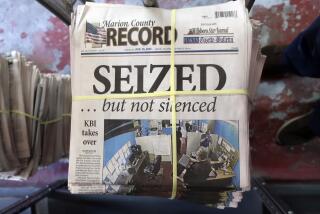D.A. Search Shuts Down Legal Newspaper in L.A.
- Share via
District attorney’s investigators armed with a search warrant shut down the Los Angeles legal newspaper the Metropolitan News-Enterprise for three hours Thursday, sending reporters and staff out to the street, in a mission to obtain proof that a law firm paid for an ad in the paper more than two months ago.
Roger M. Grace, owner of the newspaper, said that after a telephone conversation with Los Angeles County Dist. Atty. Steve Cooley and two subordinates, he agreed, once they gave the name of the law firm, to turn over the business records requested and that the closure ended when he did so.
But Grace said the afternoon edition of his paper was delayed by the closure, and he assailed Cooley for using “exceedingly poor judgment and failing to realize how abhorrent a newsroom search would be to our 1st Amendment rights.”
A few hours later, Cooley issued a statement saying, “The Metropolitan News was closed due to the initial refusal by a co-publisher of the newspaper to cooperate” with a broad-ranging investigation into a recall election in South Gate.
“This search had nothing to do with 1st Amendment rights,” Cooley said.
“The district attorney’s office did not search the newsroom of the Metropolitan News,” Cooley said. “This was a focused and narrow search. We were only requesting business documents for one transaction.”
But Grace said that he had been told the search could last as long as three days, all for the origins of a tiny ad Feb. 21 giving notice of intent to circulate recall petitions in a small suburban city.
Grace said a Cooley aide had told him reporters’ desks would be searched if necessary to find the advertising records.
“I’ve had good relations with Mr. Cooley in the past,” Grace said. “During our conversation, he offered to settle this over dinner. But now I don’t think he’s the kind of man I would like to go to dinner with.”
Experts on the 1st Amendment expressed concern at what happened.
USC law professor Erwin Chemerinsky called the episode “enormously troubling” given recent statutes severely limiting newsroom searches.
Alonzo Wickers, a leading Los Angeles media attorney, observed, “I think it was a lot of bullying. They cleared the newsroom, disrupting operations, threatening to keep everyone out for three days.
“And they did this to a small newspaper,” Wickers added. “I don’t believe there’s any possibility they would have attempted this with the L.A. Times. I believe this was illegal and completely inappropriate.”
Grace and Cooley agreed that there had been discussions going back two or three weeks over the district attorney’s demand that the newspaper turn over the records that would prove the Los Angeles law firm of Albright, Yee & Schmit had paid for the recall petition ad.
Grace said, however, that initially Cooley’s office would not acknowledge that the district attorney knew the name of the firm and that the Metropolitan News felt it would compromise its private business relationship if it divulged it.
Finally, he said, when it turned out that Cooley knew what law firm it was, there was no point in refusing to turn over the documents.
Cooley’s statement asserted that investigators had been assured two weeks ago “we would have full cooperation” with providing a legal document requesting the material and that Grace had initially reneged Thursday morning.
Grace called that a misstatement of the facts.
Late Thursday afternoon, the district attorney’s office faxed to news reporters a list of what was finally obtained from the Metropolitan News office. It included “three-page copies of the original [advertising] invoice [from] the first desk, first row [and a] two-page faxed document taken from second desk, second row, north side.”
The Metropolitan News has a circulation of about 2,500 and a staff of 55 in its downtown office, Grace said.
*
Times staff writer Anna Gorman contributed to this report.
More to Read
Sign up for Essential California
The most important California stories and recommendations in your inbox every morning.
You may occasionally receive promotional content from the Los Angeles Times.













